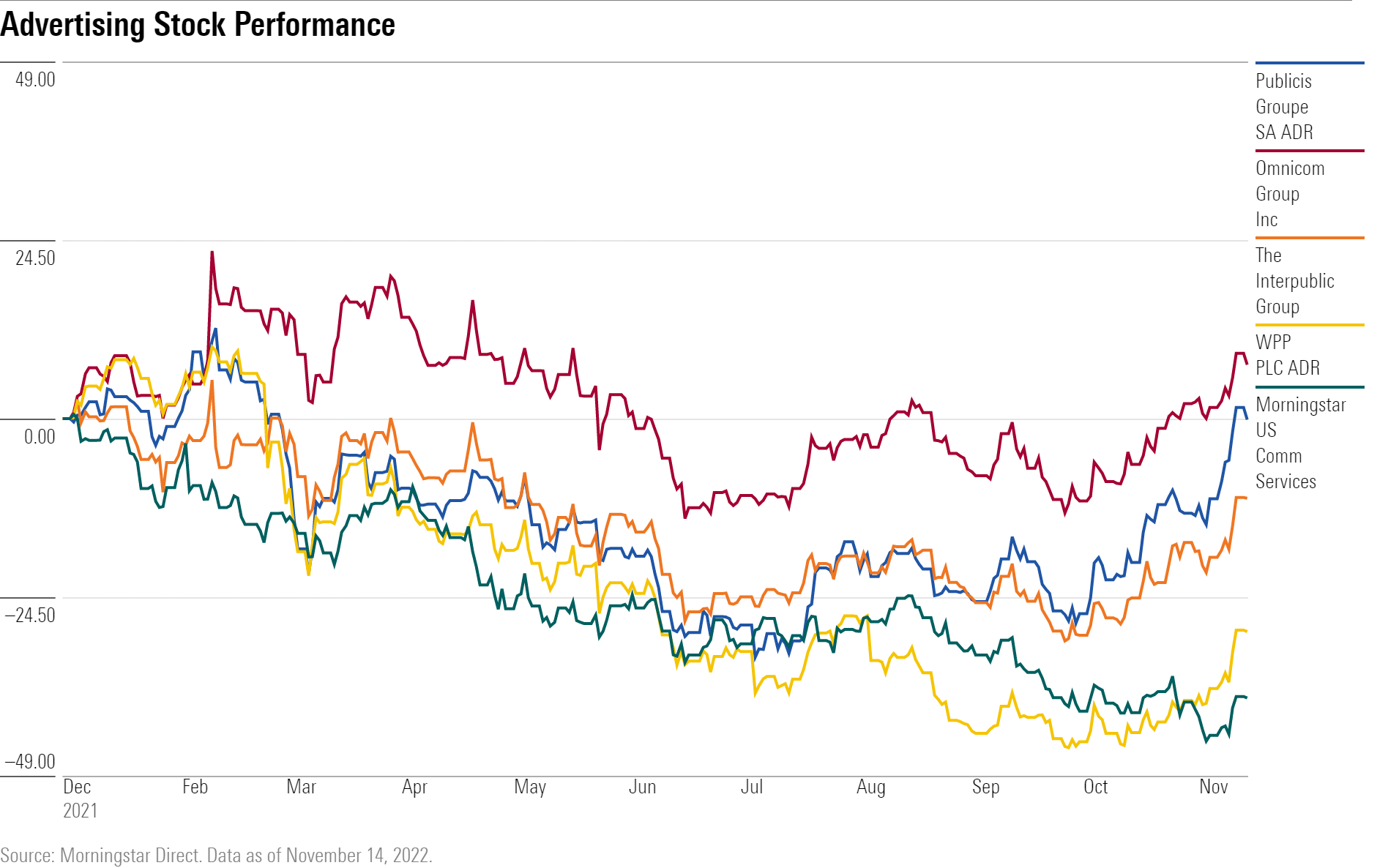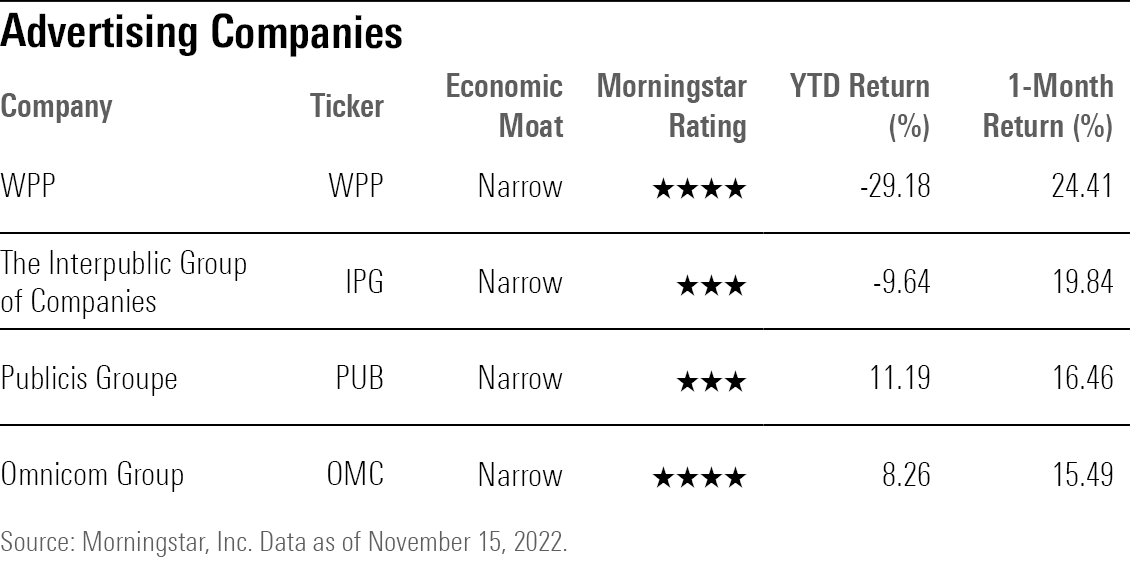One Surprising Industry Is Delivering a Strong Performance
These traditional advertising stocks are attractively valued, with strong fundamentals.

While some of the biggest players in online advertising are seeing their stocks get hammered this year, one group is quietly outperforming: Traditional advertising agencies.
From internet goliaths Meta Platforms (META) and Alphabet (GOOGL), to the entertainment powerhouses Netflix (NFLX) and The Walt Disney Co. (DIS), to the electronic gaming leaders such as Electronic Arts (EA) and Roblox (RBLX), to telecom leaders Verizon Communications (VZ) and AT&T (T), many stocks that land in the communications sector are suffering losses worse than the overall market.
Overall, the Morningstar US Communication Services Index is down nearly 40% year-to-date while the Morningstar US Market Index has fallen 18%.
These mostly consumer-focused companies have been hit hard by expectations of a recession against the backdrop of high inflation, rapidly rising interest rates, and changing customer behaviors.
But it’s a different story for old-school advertising companies:
The agencies are moving beyond their traditional role of creating and placing advertising in print, broadcast, cable television, billboards, and direct mail to providing data analytics, designing digital advertising solutions, and performance-management services for companies in response to the explosion of social media platforms and mobile ads.
The new avenues of growth for advertising stocks are appealing to investors who are also attracted to the strong cash flows they generate as well as their enticing dividend yields.

Much of the transformation in digital advertising is being driven by privacy protection features introduced by Apple (AAPL) in 2021 that makes it more difficult for third parties to collect data from customers. Known as App Tracking Transparency, the feature gives users the ability to allow or opt out of apps that track and target advertisements toward them. Many users are opting out. Companies such as Snap SNAP and Meta have cited the feature as a reason for revenue shortfalls. As might be expected, App Tracking Transparency has been a boon for Apple’s mobile advertising product, Apple Search Ads.
“Ad holding firms continue to benefit from the impact of Apple’s policies on overall digital advertising,” says Ali Mogharabi, senior equity analyst at Morningstar. “The policies have forced advertisers to seek assistance in first-party data management, analytics, and performance measurement more aggressively, which along with continuing strong demand for digital transformation has been driving growth in precision marketing.”
Before Apple introduced its privacy features, Europe’s 2018 adoption of the data privacy and security law known as General Data Protection Regulation, or GDPR, jump-started changes in digital advertising designed to protect consumers.
A World Without Cookies
More change is coming as Google plans to phase out the use of “cookies” by third-party advertisers in its Chrome browser by 2024, a move that has been delayed numerous times. Cookies allow advertisers to track the activities and spending habits of online users and personalize advertisements to target customers.
The end of cookies has given rise to what’s called “first-party data,” in which companies collect and own the data of their customers and can target advertising to them based on purchasing history and loyalty programs. Contextual advertising, using artificial intelligence to understand the environment in which a user is browsing to create advertising targeted at them rather than tracking past behaviors, is increasingly popular as companies abandon the cookie approach.
Many of the high-flying technology, entertainment, and telecommunication companies that comprise the communication services index saw their growth prospects upended by a newly unfavorable environment, driven by rising interest rates. Investors have been less willing to pay a premium for their stocks.
Most of the companies in the index found themselves challenged by changes in customer behavior in this postpandemic, inflationary world, and dealing with tough comparisons after two years of outsize gains. Whether it was price increases driving away existing customers in the telecommunications space, increased competition making it tougher to add new customers as well as rising content costs in the streaming video space, or a slowdown in digital advertising spending which many of the big social media platforms depend on, companies find themselves struggling.
The advertising agencies, though, have fared better and should continue to benefit. The new digital advertising trends should provide an offset to the challenges they might face to their traditional businesses amid slowing economic growth.
Mogharabi rates the group attractive based on their valuations, strong third-quarter results, upbeat outlooks, cash flows, and hefty dividend yields.

Strong third-quarter results delivered by the advertising companies are a stark contrast to the communication services sector in general. The sector reported the highest percentage of earnings misses of any group in the third quarter, and that was after earnings estimates had already been lowered. Also, more companies within the communication services index saw their fair value estimates cut by Morningstar analysts in the third quarter than any other sector.
- Omnicom Group: Beat third-quarter revenue and earnings estimates on organic growth across all its offerings, “led by clients’ strong demand for digital transformation and data analytics services.” Trading at a 15% discount to Mogharabi’s fair value estimate of $90 a share, he views the narrow-moat stock with a 4% dividend yield as attractive.
- Publicis Groupe: Reported better-than-expected third-quarter revenue growth with “strong contributions from the firm’s consulting and data analytics services.” It raised its full-year revenue outlook, free cash flow expectations, and sees operating margins coming in at the high-end of previous guidance. Mogharabi maintains his fair value estimate of EUR 69 and sees the stock as attractive.
- Interpublic Group: Digital services and analytics drove better-than-expected third-quarter results. The shares of this narrow-moat firm, which has a 3.8% dividend yield, remain attractive, Mogharabi says, and he is maintaining his $35 fair value estimate.
- WPP Group: Also beat expectations for third-quarter revenue and sees full-year revenue as being in the upper range of its previous guidance. Mogharabi maintains a fair value estimate of $81 on the ADRs, representing significant upside from current levels.
The author or authors do not own shares in any securities mentioned in this article. Find out about Morningstar’s editorial policies.

/s3.amazonaws.com/arc-authors/morningstar/ed88495a-f0ba-4a6a-9a05-52796711ffb1.jpg)
/d10o6nnig0wrdw.cloudfront.net/04-22-2024/t_ffc6e675543a4913a5312be02f5c571a_name_file_960x540_1600_v4_.jpg)
/cloudfront-us-east-1.images.arcpublishing.com/morningstar/PKH6NPHLCRBR5DT2RWCY2VOCEQ.png)
/cloudfront-us-east-1.images.arcpublishing.com/morningstar/54RIEB5NTVG73FNGCTH6TGQMWU.png)
:quality(80)/s3.amazonaws.com/arc-authors/morningstar/ed88495a-f0ba-4a6a-9a05-52796711ffb1.jpg)